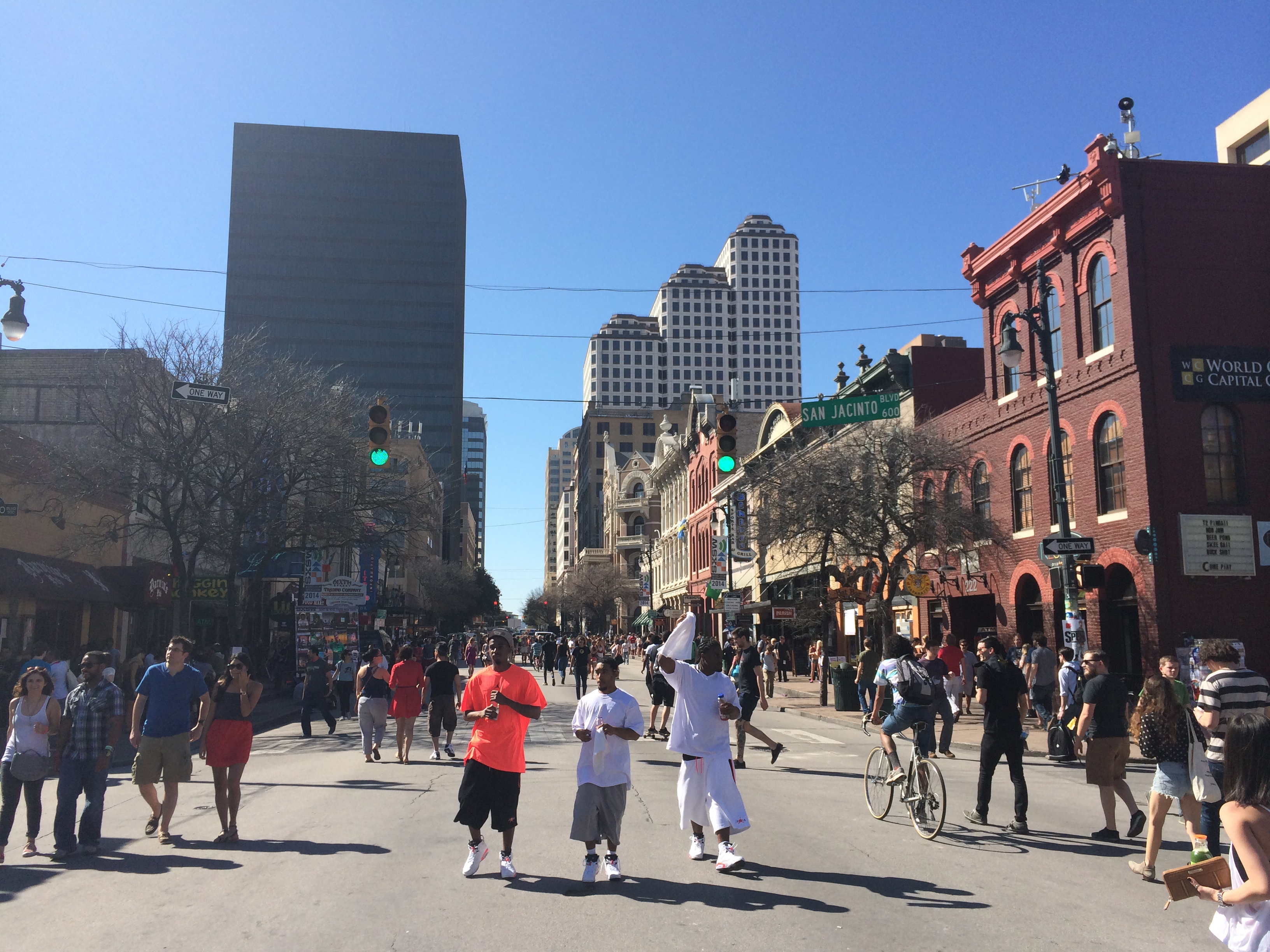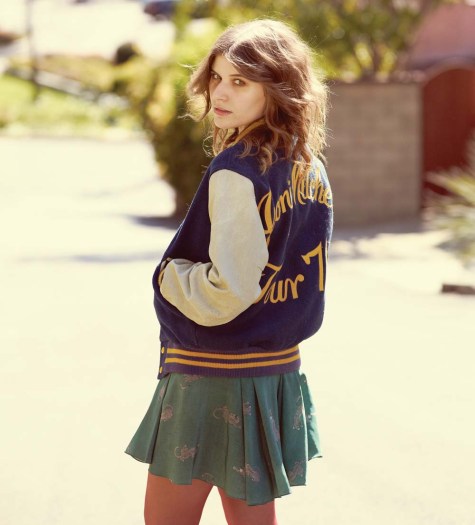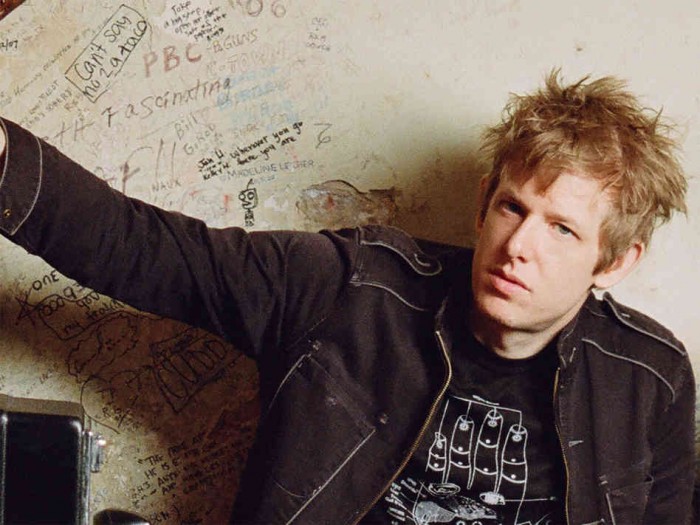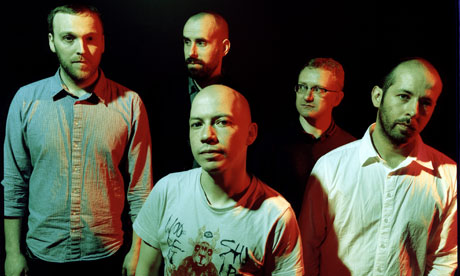
“We need to redefine what pop music is”
Mystery Jets is one of the top bands of the alternative music scene in the UK. They’ve been together for more than 10 years now, releasing 6 albums and gaining loyal fans wherever they go.
Pushing themselves to try new things with every album, in 2016 they’re releasing «Curve Of The Earth» (Caroline International, 2016), an album that expand the sound of the band to new sounds and feelings.
We had the chance to talk to Blaine Harrison andWilliam Rees in Madrid about the album, their career and music in general. A pretty interesting chat with the band that has released one of the best albums of 2016 so far.
Almost four years since Radlands. Tell us a little bit what you’ve been doing in this time.
Will: We toured a lot. We went all over America and Europe supporting Mumford & Sons, a big world tour. After that, towards the end of 2013 and the early part of 2014 we set up our own recording studio and basically began what would go on to become the Curve of The Earth album.
After experiencing success do you feel the need to set up an appropriate place to record?
Blaine: I think we set up the studio almost out of necessity because we’d gathered so many instruments and things on the road that we never had any where to put it all. It always seemed like such a shame only bringing this stuff out of the closet when you made a record. So we decided we wanted all these things around us because it’s really your toolbox when you’re musicians – having all your sounds to play with.
I think the studio played a big influence on, partly how long the record took – it took longer than other albums – but also on the sound. I feel like there’s inspiration that comes from having these things around you that inspire you – synthesizers and amplifiers.
«It feels like we’re a new band»
Do you prefer having your own studio than go to another one?
Blaine: I really like it. I think more than anything it was exciting because it was new for us having our studio.
Will: It means also you can work all day and all night and never stop because no one is going to kick you out. You can live there, sleep there, which we did. And that’s a great thing when you’re being creative because the muse can come down and strike at any moment. You need to be ready day and night to capture that.
If you have a look at your previous albums it’s difficult to know which musical direction you are going to take. How did you approach the sound of this album? Did you have something in mind when you started?
Blaine: Not really.
Will: There was a kind of blueprint. We knew we wanted to do something grand and we knew we wanted to make very much an album that works beginning to end and that you can’t pull apart, an album where everything supports each other like a delicate structure. Not an album with two or three singles that stand out but very much a whole journey.
Blaine: Also from the last album we recorded it in America. It was very exciting for us to explore the tradition of American song writing and Americana. We learned a lot from that. Living in Texas was kind of a master class in writing in a new way.
I think when we came back it was interesting to apply what we’d learned in that context but put it in a new – with new sounds.
I remember thinking I wonder what a country album in space would sound like.
You throw those kind of albums around at the beginning but what you end up with is very rarely recognisable as the things you began with.
I think it has a very polished sound with some psychedelic tunes, good melodies. I also feel it’s very intimate, very spiritual.
Blaine: It was a very small room.
Is this the most personal album? The one that takes longer to create?
Will: I think it is, yes. I think the fuel of the album, where the songs come from, what the inspiration is is all very personal stuff, it’s all from experience.
I think on previous albums we were looking outside ourselves for inspiration and achievements and things to attain – like singles. Things were more extrovert. But this time around we kind of almost stuck our fingers up at what was going on in music in the rest of the world and just set up our own studio, locked the door and stayed in there day and night and just really tried to tap into what was going on internally.
So I think that’s definitely a big difference between this record and the four others.
Blaine: It’s as much about inner space as it is about outer space.
When did you realise you wanted to produce the album yourselves?
Blaine: It just sort of happened really.
Will: Everybody else was booked up.
Blaine: It’s true.
Will: We did ask a few other people but they were too busy.
Blaine: I don’t even remember them being too busy. We brought a couple of people into the studio and we sort of sat them down and we said this is the room and these are the songs, how would you do this?
I remember one particular producer was sat there and he was like, ‘What’s the question?’
We were like, ‘Do you want to do it?’
And he said, ‘But you’re already doing it. You’re already making the album.’
It took somebody else to say that. We were like, ‘Shit. Fuck. We’re on our own and we don’t have a choice about it.’
Will: But that was the best thing ever really, doing it ourselves. It’s a kind of rite of passage, self producing.
Blaine: It just sort of happened. It wasn’t even a decision really.
The next album are you also going to produce yourself?
Blaine: You never know.
«If your not together as a band your records are going to sound like that»
Have you made a step forward with this album? Do you feel it marks a turning point for the band?
Will: I do.
Blaine: I think as a band it feels like a new band.
Will: Writing-wise as well. You can’t really separate the two – they’re very connected. We have a new bass player now, a guy called Jack Flanigan who joined us at the beginning of this album two years ago.
He basically pumped fresh blood into the band and kind of brought it back to life and made us feel like a gang again.
Having him on board is like going back to year zero. It’s like a new band.
Blaine: When you start out you are a gang because you all share the same hunger and the same aspirations and inspirations. Sometimes what happens is when your dreams become a reality, which is kind of what happens when you get signed – it’s everything you ever wanted – and you go off on the road, on the rollercoaster of touring and you sometimes need to stop the rollercoaster and have a sort of stock check and say, ‘Fuck everything else. Are we together?’ Because if your not together as a band your records are going to sound like that. They’re going to sound splintered.
We realised there was a very important presence missing from the band and Jack completed the gang. The record sounds the way it does because we all had that mentality back.
Will: Enthusiasm.
At this time of your career do you think about the risk of this new direction or was it just the right moment to make this album?
Will: In what way?
Maybe the fans – when I listened to this album I was thinking it sounded like a completely different band, at least the first couple of times, and then I see some things that I related to your music, your sound. I don’t know if it’s a bit risky?
Will: For us it feels completely natural. It just feels like the most natural kind of change possible. I think maybe on some levels it is very different and it could be perceived as risky but when you go deep into it it’s still the same. It’s still these voices, it’s still these musicians, still these people playing together. It’s coming from the same place.
Blaine: I think the kind of records we love as a band are the kind of records that don’t necessarily hit you right away face on but they’re the kind of records that you have to let them get under your skins. I think we knew we were making that sort of a record. Certainly I feel it is that kind of an album. It’s not packed with eight singles. There isn’t going to be – it’s not a pop album in the traditional sense of the word.
But I think your job as a musician is to redefine what pop music is. Constantly you should be asking that question.
I think it gets better the more you listen to it.
Blaine: Good.
Will: That’s good.
Blaine: As long as it doesn’t get worse!
Will: That’s what we wanted.
After releasing an album whose feedback do you care most about? Do you think about the reaction of the fans who have been following since the beginning? Or do you ask friends or family?
Blaine: Probably my mum.
Some musicians say that they don’t want external opinions before it’s finished, but does that happens in your case?
Blaine: I think there’s something about what your mum thinks about what you do that you can try to run away from it as much as you like but you could have the greatest rock critic in the world slag off your record but if your mum likes it you could sleep at night and could be the happiest person in the world. That’s all I care about.
Will: I care about what the fans think, the people who follow Mystery Jets, definitely. I think without them we wouldn’t be where we are so I think it’s hugely important.
Blaine: But in terms of-
Will: But at the same time we’ve always followed our noses and out gut instinct and our own inspiration really.
Blaine: I think in terms of people we play our records to, someone whose opinion is still important is Erol Alkan, who produced Twenty One, our second album. He’s always felt like a big brother to us. In a way all the producers we’ve worked with have kind of been that but out of everyone in our history he’s someone who the first time you play Erol your record you’re shaking because we really do care what he thinks.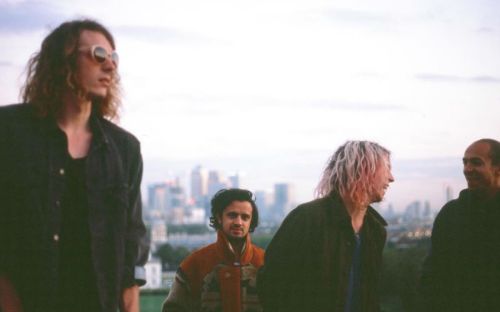
It’s been ten years since your debut album. Nowadays it’s hard to find a band that lasts that long. How do you feel? Do you feel like you’re not a young band anymore now you’ve seen ten years go by?
Will: We’re not a young band anymore.
Blaine: We’re not new.
Will: But I think we feel new. I think we feel as excited about this album as our first or our second or third or fourth. And that really is the kind of most important thing. If we didn’t feel like that then-
Blaine: We’d call it a day.
Will: We’d call it a day or we wouldn’t even release the record.
Blaine: I remember as a kid reading an interview with the Spice Girls and the Spice Girls saying that, ‘When it’s not fun and we’re not friends anymore then that’s the time to stop.’ For me that’s been my motto for the Mystery Jets. As long as we’re friends and we enjoy what we do.
Is that the secret to keeping a band together?
Will: The real secret is listen to the Spice Girls more.
«We’re not a young band anymore»
How do you get on with new technologies because you started when Myspace was almost closing down?
Will: We were pre-Myspace actually. We were before Myspace. It closed down in 2007 didn’t it? I thought the peak was 2007. I’m not sure.
Blaine: We’ve actually still got a profile on Myspace. There’s a lot of dust on it but if you dust it off it’s like an old relic – our profile still there.
I think don’t pay the artists fairly?
Will: It’s probably true.
They are important things to engage with because everybody uses them and therefore we use them as well because it means people can listen to our music more easily.
I think a lot of people, and we’re included in this, have a slightly uneasy relationship with social media and streaming services and stuff. It’s not totally clear what goes on behind the scenes.
Blaine: It’s interesting as a generation we sort of fetishize things like vinyl, lomography cameras and polaroid’s, which are really the technology of our parents’ generation. We have a yearning for simpler times. And yet my mum and my dad have I Pads but I don’t. I think that’s one of the most fascinating things about technology. There’s a sort of juxtaposition where you yearn for the things that you can’t have.
But I think technology really, it’s a bit of a chicken and egg situation because the technology that exists out there is a reflection of the needs people have for it. But at the same time the technology is facilitating how people want to engage with it. A really good example of that is the idea of the death of the album and everyone wants byte size, it’s shuffle culture.
I even read an interview with Roger Waters. He said, ‘Why would I make another album? No one listens.’ And this is the guy who invented the concept album.
Will: That’s incredibly cynical
Blaine: Exactly. You think did you make albums in the first place because it was really important to you how people digested those records or did you make albums because it was about creating a cohesive piece of art? I think that’s where there’s a sort of line in the sand with technology. Do you cater, do you write your music to cater for the way people use technology or do you write it in spite of technology?
Will: I think for me technology is kind of like this fierce dog running around and barking. You’ve got to keep it on a leash and you’ve got to hold that leash tight. You can’t let the dog lead you astray even though it wants to. So I think how you have a relationship with technology is very important and it should be a balanced relationship and you should question technology – not believe everything it’s trying to get you to believe.
For example Adele, she doesn’t stream any of her music. She’s the biggest selling artist on the planet of all time. So how much do we need streaming? How relevant is streaming in that case? You have to question it and not be blind to the demands of it otherwise it will end up using you and spitting you out and you’ll end up looking like a fool in technology or on social media. You’ve got to have a weary relationship with it.
Blaine: People say streaming is the future but in 1990 people were saying that Mini Disk was the future. More often than not new ways of engaging with technology and new platforms appear but sometimes they might just be a stepping stone to a better solution.
Will: I think it’s all a stepping stone. And inspiration is still inspiration. Music is a separate thing but they meet somewhere.
In this time and age do you find it difficult to get people to listen to your albums? Like people just listen to a single or the top ten on Spotify?
Will: There’s so many factors that effect.
There’s a lot of music coming out these days.
Will: There’s so many variables and factors and things that get in the way of people coming to your music or things that help your music get to other people. There’s so many little things.
Blaine: Ultimately all you can do is give people the choice. Because it is someone’s choice if they want to or not.
Will: But who’s choosing what the choice is?
Blaine: I think as long as you’re making albums and you’re presenting your work in its purest form, which is as a record, I think when the option’s there for people to digest it. But if they want to listen to tracks-
Will: But aren’t you asking more how music gets out to people? How music reaches people?
Do you find it harder now than ten years ago to get to people?
Will: I think there’s always been lots of good new music and there’s always been lots of new music. It largely depends on your label – how hard they work and how well set up they are.
Blaine: I think we’ve always been a band who, we’ve always felt like touring is a really important part of sharing music. There’s something about a live performance that you can’t put in a bottle, you can’t distil it. You have to be there, you have to taste it. It’s a feeling you’re left with for days. So as long as you don’t forget that and as long as people are coming out and seeing shows I think they’re getting something really essential. I think the better band you are live the more that will connect through with your records.
If you had to start the band now would you change something?
Will: I’d make our drummer the front man. I’d get him singing on a couple of singles.
Blaine: I used to actually be the drummer so I think I would have stayed the drummer and found someone else to do the singing bits. No, I think we’ve made some questionable fashion crimes.
Will: We’ve committed some crimes against fashion. Definitely.
Blaine: We’ve committed some crimes against fashion but we’ve done our time in fashion prison so we’ve paid the price.
You’re a very polyvalent band. When you do the next album do you have something in mind?
Will: I think it’s too early to say. Also there’s one part of your brain that really wants to go to LA or Japan and make a record with the coolest producer in that part of the world for that time and that can be really good. But there’s another part of your brain – the more emotional side – which is really where the music comes from and ultimately you have to respect that side and let that decide. So that’s why it’s kind of hard to say.
We’re always listening to new music and new producers and interesting new stuff. That’s exciting.
Blaine: I think we’ll probably, I’d really like to make a really fast record next. Something that’s kind of the opposite of Curve The Earth. Not that Curve The Earth is slow but I think it’s an album where we very much let it breathe and I’d like to make a record with no breathing space in it, a record that’s just like da-da-da-da-da and then it’s over – like a machine gun. We’ve got one of those in us.
That would be great. Any plans to tour in Spain?
Will: Hopefully we’ll be doing some festivals and playing in April. April/May time we’ll come and do a tour hopefully. Nothing’s booked yet but we’d love to do that.
Last question, are you happy?
Will: Generally? I think life is not about being happy, but sometimes.
Blaine: I’m really happy but I’ve just had a really strong coffee.



















